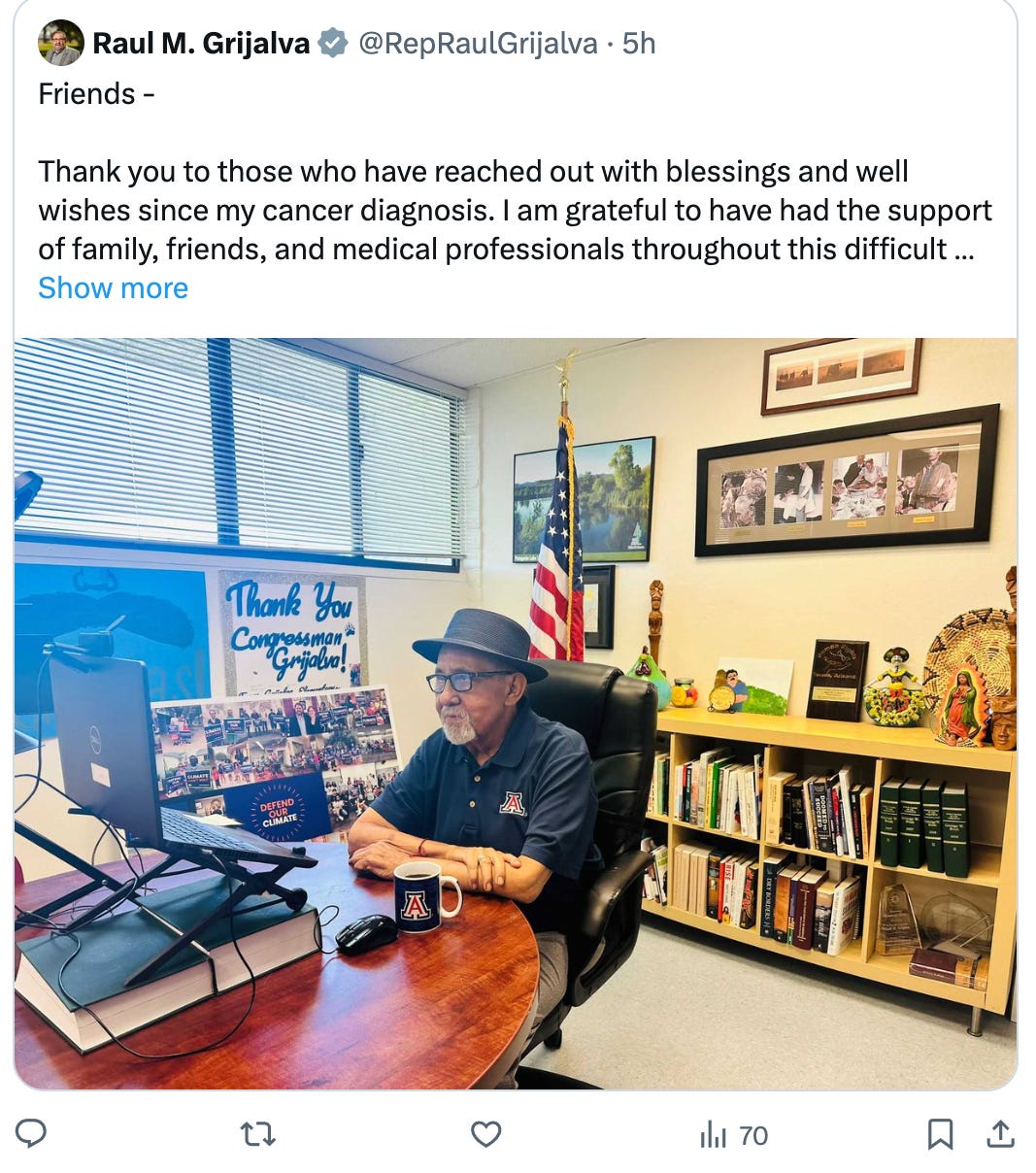The Daily Agenda: The company they keep
Four Dems are running to replace Bronson ... Who got the big endorsements? ... Lots of federal dollars for Tucson transit.
The race for the county supervisor seat in District 3 has the most crowded field out of all five supervisor races this year, likely due to the fact that this is the first time in nearly three decades that Democratic former Supervisor Sharon Bronson isn’t running.
Bronson resigned last winter for health reasons and four Democrats are campaigning to replace her. Whichever Democrat wins the July 30 primary will face Republican Janet Wittenbraker in November. That contest will decide whether Democrats maintain a 4-1 majority on the board of supervisors, or slip to a 3-2 margin.
And if Republican Steve Spain pulls out a win in District 1, which he narrowly lost in 2020, the Democrats might lose their majority altogether and county policies could shift to the right on homelessness, supporting asylum seekers, social services and law enforcement, among many other issues.
For now, the choice for Democratic voters is who they want to run against Wittenbraker. So who did local big-time Democrats endorse?
Bronson picked Edgar Soto, a vice president at Pima Community College and longtime baseball coach, to succeed her, saying he “puts people in front of policies.” Soto also got the backing of state Rep. Betty Villegas, Tucson City Councilman Richard Fimbres, and Justice of the Peace Maria Felix.
For Miguel Cuevas, who works in the tech industry and served on the Tucson Unified School District governing board from 2009 to 2012, the fact that Bronson didn’t endorse him might be an advantage. He says he won’t have any of the “hangups” that Bronson had with other county officials. He also didn’t seek the endorsement of any elected officials at all, saying he wanted to focus on talking to constituents.
On the opposite end of the endorsement spectrum is Jennifer Allen, a longtime nonprofit director who comes from a union family.
She got the endorsements of a wide array of local elected officials, like Tucson Mayor Regina Romero and Tucson City Council members Lane Santa Cruz, Kevin Dahl, Paul Cunningham, and Karin Uhlich, along with Congressman Raúl Grijalva, state legislators Priya Sundareshan, Nancy Gutierrez, Rosanna Gabaldon, and Chris Mathis, among others.
April Hiosik Ignacio, a blue-collar worker and community organizer in the Tohono O’odham Nation, has the support of Pima County Recorder Gabriella Cázares-Kelly, state Rep. Mariana Sandoval, and Verlon Jose, chairman of the Tohono O’odham Nation.
As for where the candidates stand on the main issues they’d handle if elected, three of them participated in a June 29 debate hosted by the Democrats of Greater Tucson and moderated by Curt. Ignacio had a scheduling conflict and couldn’t attend. (We’re working on scheduling an interview with her).
The candidates gamely answered questions for more than 90 minutes. You can watch the video of the debate above. We’ll be back next week with a rundown of what the candidates said they planned to do about some of the most important issues the county faces.
There’s a lot at stake in this year’s elections. We’re staying on top of it. If that’s what you’re into, consider upgrading to a paid subscription.
Asked and answered
Cuevas is the only candidate in the District 3 race who has ever held elected office, which gives him an advantage when it comes to experience. But it also means he has a record he has to defend.
After we wrote about him two weeks ago, Agenda readers brought up one of the controversial choices he made as a TUSD board member, when he voted to end the Mexican-American Studies program.
He says he made the choice at a time when TUSD was struggling financially and Republican legislators threatened to cut funding.
“While I believed the law was unconstitutional and a remnant of Jim Crow laws, I knew that a lengthy court battle would ensue, and TUSD could not weather the legal fees as it was near bankruptcy, which could have led to a possible further Arizona Republican leadership takeover of TUSD,” Cuevas said.
When it came time to vote on the MAS program, he voted with the majority on the board “as I negotiated that the ethnic studies programs must come back, and my subsequent actions proved it,” he said, adding the multicultural curriculum and ethnic studies program remain in operation at TUSD.This story was supported by the Local News Initiative of Southern Arizona, a fund of the Community Foundation for Southern Arizona.
Federal dollars on their way: More than $11 million in federal funding is coming to Tucson’s transit system, the Arizona Daily Star’s Charles Borla reports. The money will be used to upgrade a maintenance facility and 80 bus stops. Work is expected to start in about a year and will focus on underserved communities, particularly those that lack shade and deal with urban heat islands.
Uncertain impact: A Pima County judge said the City of Tucson has the authority to nix overhead transmission lines in certain areas, the Star’s David Wichner reports. The ruling could impact Tucson Electric Power’s proposal to install those lines in midtown Tucson, but it’s not quite clear, since the ruling dealt with a route that TEP no longer plans on using. TEP argued that the project was an upgrade, rather than a new installation, and state law preempted city ordinances. But the judge said state law allows cities to regulate how those lines are constructed.
Psychosocial needs: The Pima County public library system got a $58,000 grant to study psychosocial needs as libraries morph into support systems for vulnerable residents, including unhoused people, KGUN’s Joel Foster reports. The money comes from the Institute of Museum and Library Sciences and will pay for a consultant to evaluate existing resources and make recommendations to improve social services.
Ballots incoming: As of Tuesday, nearly 8,000 voters in Pima County had returned their ballots, according to Uplift Campaigns, a digital firm for Democratic campaigns. An analyst with Uplift tweeted that 17,000 ballots were returned on Wednesday. The statewide total so far is about 117,000 ballots returned already.
Tragic trend: As the demographics of migrants changed in recent years, more women are dying at the U.S.-Mexico border, Jessica Kutz reports for The 19th. The trend is unfolding along various parts of the border, including Southern Arizona, where the percentage of women migrants who died has doubled since 2020, from about 10 percent to 22 percent last year.
Bye bye, grocery stores?: If the Krogers-Albertsons merger gets approval, eight grocery stores in Tucson could be sold, KVOA’s Sarika Sood reports. The list includes three Albertsons and five Safeway stores in Tucson, along with Safeways in Oro Valley, Green Valley, and Sierra Vista.
$76,000: The salary for county supervisors in Arizona. The state Legislature sets the salaries and supervisors are scheduled to get a pay bump to $96,600 next year.








The potential shake-up in ownership/operation of our Safeway/Albertsons underscores my theory that ,eventually, everything will be owned/operated by Kroger, Roger Penske, and Anheuser-Busch.
Thanks, y'all! I'm going through my ballot now and this is super helpful!